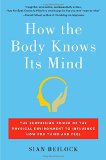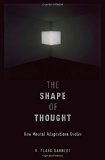February 9, 2015

Thinking about Thinking: Cognition, Science, and Psychotherapy by Philip E. McDowell (Routledge, 2015)
(amazon.co.uk)
Book description from the publisher:
This book examines cognition with a broad and comprehensive approach. Drawing upon the work of many researchers, McDowell applies current scientific thinking to enhance the understanding of psychotherapy and other contemporary topics, including economics and healthcare. Through the use of practical examples, his analysis is accessible to a wide range of readers. In particular, clinicians, physicians, and mental health professionals will learn more about the thought processes through which they and their patients assess information.
Comments (1)
- cognitive science,new books,psychology
January 27, 2015

The Brain’s Way of Healing: Remarkable Discoveries and Recoveries from the Frontiers of Neuroplasticity by Norman Doidge (Viking, 2015)
(kindle ed.), (amazon.co.uk), (UK kindle ed.)
Book description from the publisher:
The New York Times bestselling author of The Brain That Changes Itself presents astounding advances in the treatment of brain injury and illness
In The Brain That Changes Itself, Norman Doidge described the most important breakthrough in our understanding of the brain in four hundred years: the discovery that the brain can change its own structure and function in response to mental experience—what we call neuroplasticity.
His revolutionary new book shows, for the first time, how the amazing process of neuroplastic healing really works. It describes natural, non-invasive avenues into the brain provided by the forms of energy around us—light, sound, vibration, movement—which pass through our senses and our bodies to awaken the brain’s own healing capacities without producing unpleasant side effects. Doidge explores cases where patients alleviated years of chronic pain or recovered from debilitating strokes or accidents; children on the autistic spectrum or with learning disorders normalizing; symptoms of multiple sclerosis, Parkinson’s disease, and cerebral palsy radically improved, and other near-miracle recoveries. And we learn how to vastly reduce the risk of dementia with simple approaches anyone can use.
For centuries it was believed that the brain’s complexity prevented recovery from damage or disease. The Brain’s Way of Healing shows that this very sophistication is the source of a unique kind of healing. As he did so lucidly in The Brain That Changes Itself, Doidge uses stories to present cutting-edge science with practical real-world applications, and principles that everyone can apply to improve their brain’s performance and health.
Google Books preview:
See also: Author’s website
Comments (0)
- cognitive science,new books
January 21, 2015

Murder in the Courtroom: The Cognitive Neuroscience of Violence by Brigitte Vallabhajosula (Oxford University Press, 2015)
(amazon.co.uk)
Book description from the publisher:
Answers to many legal questions often depend on our understanding of the relationship between the human brain and behavior. While there is no evidence to suggest that violence is the sole result of cognitive impairment, research does suggest that frontal lobe impairment in particular may contribute to the etiology of violent behavior.
Murder in the Courtroom presents a comprehensive and detailed analysis of issues most relevant to answering questions regarding the link between cognitive functioning and violence. It is the first book to focus exclusively on the etiology and assessment of cognitive impairment in the context of violent behavior and the challenges courts face in determining the reliability of neuroscience evidence; provide objective discussions of currently available neuropsychological tests and neuroimaging techniques, and their strengths and limitations; provide a methodology for the assessment of cognitive dysfunction in the context of violent behavior that is likely to withstand a Daubert challenge; and include detailed discussions of criminal cases to illustrate important points. Clinical and forensic psychologists and psychiatrists, cognitive neuroscientists, and legal professionals will be able to use this book to further their understanding of the relationship between brain function and extreme violence.
Google Books preview:
Comments (0)
- cognitive science,new books,psychology
January 8, 2015

How the Body Knows Its Mind: The Surprising Power of the Physical Environment to Influence How You Think and Feel by Sian Beilock (Atria Books, 2015)
(kindle ed.), (amazon.co.uk)
Book description from the publisher:
An award-winning scientist offers a groundbreaking new understanding of the mind-body connection and its profound impact on everything from advertising to romance.
The human body is not just a passive device carrying out messages sent by the brain, but rather an integral part of how we think and make decisions. In her groundbreaking new book, Sian Beilock, author of the highly acclaimed Choke, which Time magazine praised for its “smart tips…in order to think clearly…and be cool under pressure,” draws on her own cutting-edge research to turn the conventional understanding of the mind upside down in ways that will revolutionize how we live our lives.
At the heart of How the Body Knows Its Mind is the tantalizing idea that our bodies “hack” our brains. The way we move affects our thoughts, our decisions, and even our preferences for particular products. Called “embodied cognition,” this new science—of which Beilock is a foremost researcher—illuminates the power of the body and its physical surroundings to shape how we think, feel, and behave. Beilock’s findings are as varied as they are surprising. For example, pacing around the room can enhance creativity; gesturing during a speech can help ensure that you don’t draw a blank; kids learn better when their bodies are part of the learning process; walking in nature boosts concentration skills; Botox users experience less depression; and much more. From the tricks used by advertisers to the ways body language can improve your memory, Beilock explains a wealth of fascinating interconnections between mind and body and how mastering them can make us happier, safer, and more successful.
Google Books preview:
See also: Author’s website
Comments (0)
- cognitive science,new books
January 3, 2015

The Shape of Thought: How Mental Adaptations Evolve by H. Clark Barrett (Oxford University Press, 2015)
(amazon.co.uk)
Book description from the publisher:
The Shape of Thought: How Mental Adaptations Evolve presents a road map for an evolutionary psychology of the twenty-first century. It brings together theory from biology and cognitive science to show how the brain can be composed of specialized adaptations, and yet also an organ of plasticity. Although mental adaptations have typically been seen as monolithic, hard-wired components frozen in the evolutionary past, The Shape of Thought presents a new view of mental adaptations as diverse and variable, with distinct functions and evolutionary histories that shape how they develop, what information they use, and what they do with that information.
The book describes how advances in evolutionary developmental biology can be applied to the brain by focusing on the design of the developmental systems that build it. Crucially, developmental systems can be plastic, designed by the process of natural selection to build adaptive phenotypes using the rich information available in our social and physical environments. This approach bridges the long-standing divide between “nativist” approaches to development, based on innateness, and “empiricist” approaches, based on learning. It shows how a view of humans as a flexible, culturally-dependent species is compatible with a complexly specialized brain, and how the nature of our flexibility can be better understood by confronting the evolved design of the organ on which that flexibility depends.
Google Books preview:
See also: Author’s webpage
Comments (0)
- cognitive science,human evolution,new books,psychology







